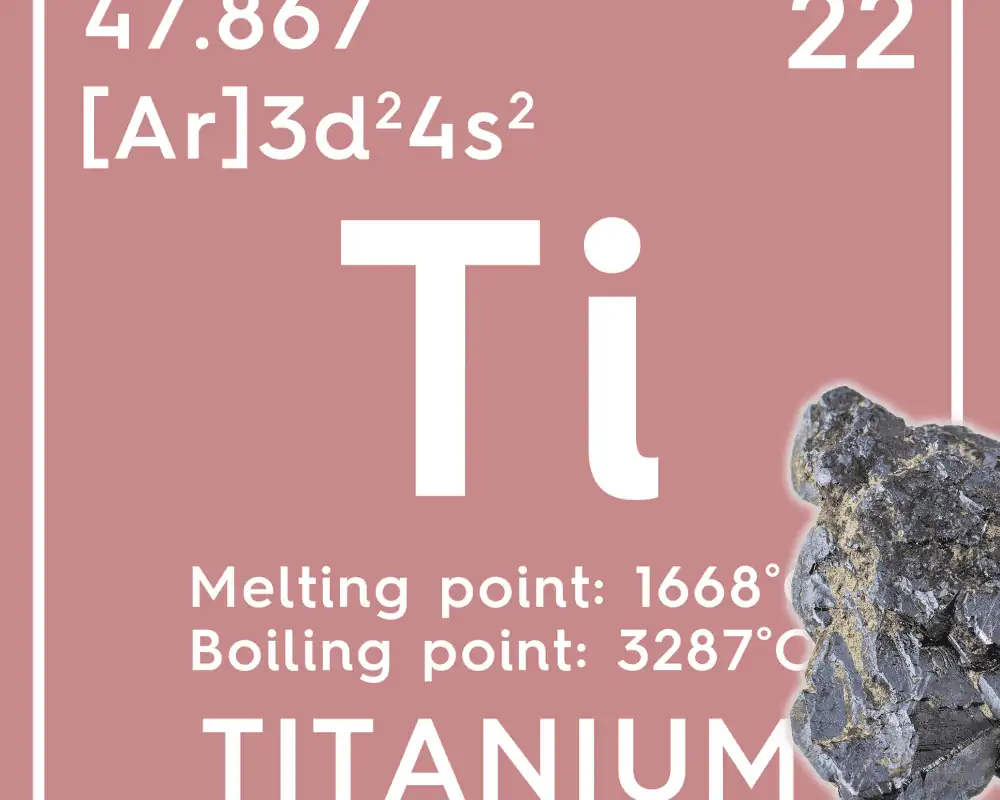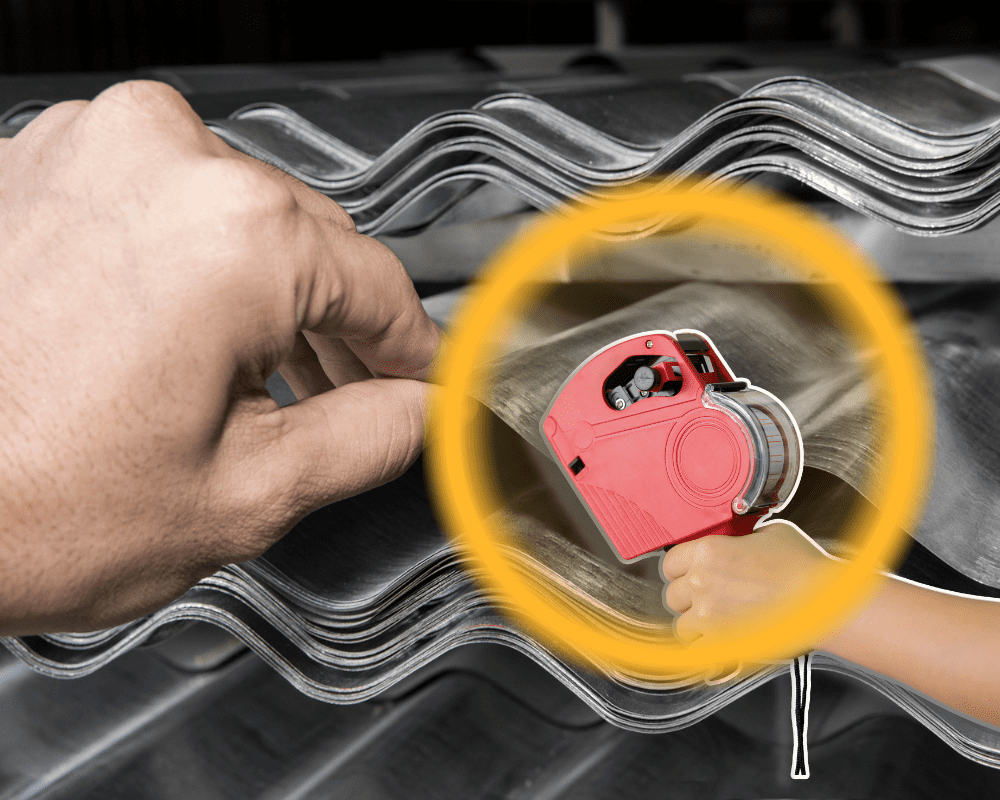Like many metals, titanium has a wide range of applications in almost every industry.
While it’s not as precious as gold, it’s extremely valuable because of its usefulness and the energy it takes to procure.
One of the more common uses of titanium is in medical implants and jewelry.
And I’m guessing this is why you’re here.
Let me spare you the build-up.
Titanium does set off metal detectors, but the frequency in which it happens will range depending on the circumstances.
To be more direct would involve some general assumptions. Instead, to get the answer best for you, keep reading.
Does Titanium Conduct Electricity?

Titanium does conduct electricity, but poorly in comparison to other widespread metals.
To give you an example, copper, one of the better conductors of electricity, is 32 times more conductive than titanium.
It’s noteworthy because a metal detector alarm reacts when the nearby metal has a high level of electrical conductance.
So the question for titanium is, does 3% of maximum conductivity provide enough disturbance to set off a metal detector?
Well, to know for sure, let’s consider how a metal detector works in a proposed environment.
Because the type of metal detector used is dictated by the need. And that matters to how well titanium is detected.
Will a Metal Detector Read Titanium?

A metal detector will read titanium if the size of the metal is large enough or the sensitivity of the metal detector is increased sufficiently.
If we’re talking about the settings of a metal detector, let’s be clear about the circumstances.
One possible reason for your interest in titanium is you’re a recreation detectorist searching for some lost ring or hidden treasure.
If that’s the case, you’ll be happy to learn that metal detector technology has advanced to a point where reading titanium can be as simple as reading copper.
So don’t worry about titanium not setting off your device just because it’s not gold.

Whether it’s pure titanium or a variant alloy, newer metal detectors have the necessary configurations to get the job done.
But remember that it’ll be challenging if you’re a beginner.
It takes practice to perfect your technique and understand your metal detector. Especially when it comes to lower conductive metals.
What Is the Color of Titanium?
Let’s assume you’ve spent the time to hone your skills. I have no doubt you can find titanium with your metal detector.
But what does it look like?

I’m sure you’ve seen your fair share of titanium rings with the classic smoky grey exterior.
What’s cool about titanium is its ability to change into any color desired, but in its natural state, it’s steely white.
Thanks to the radical changes in temperature and a process called anodizing, you can find titanium oxide in every color imaginable.
How Can You Tell if Something Is Titanium?
Since titanium comes in diverse colors, how can you tell if something is real titanium or not?
Luckily, there are several ways to test for authenticity.
Some practical methods to tell if something is titanium are using a PMI analyzer, chemical test, comparing the properties against other metals, or performing a visible alteration trial.

I’ll review these briefly, and you can decide which option best suits your needs.
The best method will always be different depending on what you’re testing.
For example, if you think you’ve found a valuable titanium relic, you won’t want to deface it. Therefore, the option with the least damaging effects is preferred.
Use a PMI Analyzer to Tell if Something Is Titanium
A PMI or Positive Material Identification Analyzer is a quick way to test the chemical composition of a metal without the risk of damaging it.
This handheld identifier looks like a price check gun found at any retail store.

By scanning the metal surface, the PMI gun returns a breakdown of its entire chemical arrangement and alloy grade in a matter of seconds.
Unfortunately, getting your hands on a PMI device costs a pretty penny.
So unless you have a spare $15,000 minimum, consider another option.
Conduct a Chemical Test to Tell if Something Is Titanium
Another way to tell if something is titanium is to use one of two methods of chemical analysis.
The first method involves iron reduction by dissolving the titanium in sulfuric acid.
The second method uses lead reduction utilizing hydrochloric acids.

I won’t pretend to understand all the science behind it, but if you want to give it a shot, both processes can be found here.
Compare Its Properties to Tell if Something Is Titanium
Comparing a sample metal to other metals is a cost-effective and safe way to tell if it’s genuinely titanium. However, its accuracy is questionable since you’re basing it on your best guess.
So what properties would you compare?
To start, you’d examine the metal’s weight, magnetism, and toughness.
If it’s really titanium, it should be lightweight, have no pull to a magnet, and be difficult to manipulate its shape.

Similar-looking metals pale in comparison to the beneficial properties of titanium.
It’s lighter than steel by 45% but just as durable. Compared to aluminum, titanium is 60% heavier and twice as strong.
Perform a Visible Alteration Trial to Tell if Something Is Titanium
The last popular method I have for you to tell if something is titanium is to remove a portion of its exterior for visual clues of its makeup.
What does this mean exactly?
If you take the metal you believe to be titanium and set it against a grinder, white sparks should scatter from the abrasive impact.

If it’s not titanium, you’d most likely see a version of yellow, red, or no sparks at all.
Again, if you don’t care about preserving the found titanium, this is a quick answer to your question.
Metal detector for Titanium
One last hobbyist suggestion before we continue on.
If you’re in the market for a metal detector for titanium, you’ll want to get one with a very low frequency or VLF.
As I said, even though titanium is electrically conductive, it’s so low that you better have a more recently made metal detector to ensure you find it.
And by the way, some form of auto ground balancing would come in handy.
You’ll likely run into some mineralized soil, and an automatic ground-balancing feature will make or break your day.

If you’re interested, I’d go with the beginner-friendly Nokta Makro Simplex.
It’s one of my favorite models. You get all the power in a pro-level device at a third of the cost.
But if you want a brand with a lengthy performance history to back it up, you can’t go wrong with a Garrett metal detector.
Does Titanium Set Off Airport Metal Detectors?
Alright! It took a while to get here, but there may be another reason for your curiosity.
Let’s discuss an alternative to why you might ask if titanium will set off a metal detector.
Is it because you’re worried about that uncomfortable moment when a triggered alarm draws unwanted attention?

I get it, believe me!
Most of the time, this happens at the airport.
You make your way through metal detectors or scanning devices, hoping each moment for that welcoming lasting silence.
So I’ll spare you the anxiety and get to the point.
Generally, titanium will not set off airport metal detectors.
Yea, titanium is conductive enough to trigger a metal detector alarm. But unlike hobby devices, airport metal detectors are looking for security threats larger than dental hardware or surgical screw.
That’s why these metal detectors are set to ignore smaller metallic items.

However, for those worried about their titanium-plated watch or 12-inch chain necklace, I’d be surprised if you weren’t stopped by TSA.
Can I Fly with Titanium in My Body?
Whether you set off an airport metal detector or not, you can fly with titanium in your body as long as your physician approves.
If the titanium in your body does happen to set off a metal detector, you’ll need to explain to the TSA officer about your implant, pacemaker, or other internal metals.
Luckily, the TSA has specialized equipment to limit the need for a physical pat-down. Specifically, airport security utilizes a full body scan with Advanced Imaging Technology (AIT), making the process less like a game of hide and seek.

Although, you need to warn the TSA agent ahead of time if you have a pacemaker or other device inside your body.
Airport metal detectors can interfere with its operation, and you don’t want that happening!
FAQs About Titanium
Questions? You have questions?
Well then, I’ve got your answers.
Is Titanium Magnetic?
In its purest form, titanium is paramagnetic, meaning it’s only weakly attracted to magnets.
Like tungsten, once you mix titanium with other metals, including nickel and cobalt, it becomes an alloy that’s slightly more magnetic.
However, only by a little, and usually not enough to cause concern around an MRI machine or powerful metal detector.

So for those with titanium plates, the data shows you’re safe if the implant is secured to the bone and not recently implanted.
But obviously, you should verify with your doctor first.
Will a Magnet Stick to Titanium?
Titanium’s magnetism is too weak; if you try to stick a magnet on some titanium, no attraction will occur.
You might still be nervous about your titanium implants and the occasional magnetic field.
It’s ok. Many people do when they’ve got something foreign in their bodies. It’s only natural that flashes of your 6th-grade science class would begin haunting you.
How about some more proof to set your mind at ease?
Repeat after me.
A magnet will not stick to titanium.
It wouldn’t move, and you’d never sense an inkling of magnetic attraction.
Do yourself a favor and watch the video below. You’ll see how ineffective magnets are to titanium.
Do Airport Scanners Show Titanium Staples?
Airport scanners, or AIT machines, do not show titanium staples if they’re inside your body.
If your titanium staples are on your exterior skin, an airport scanner might show them on the visual display.
The AIT scanners are different than traditional walk-through metal detectors. They use millimeter wave technology to scan and detect hidden objects on your body.
It’s not unusual for an airport scanner to detect the slight bump of an external staple.
The good news is that TSA agents are trained to recognize these alerts as being medical-related.
In the worst-case scenario, you might be subject to a quick pat-down.
What is Titanium Best For?
Besides dental implants and other artificial medical alternates, titanium is best used for aircraft material, jewelry, industrial machinery, and recreational instruments.

Because of titanium’s overwhelmingly beneficial properties, like its strength, flexibility, and non-corrosiveness, titanium products can be found everywhere.
Titanium has endless manufacturing opportunities, from underwater valves and exhaust pipes to golf clubs and toe picks.
Is Tungsten Stronger than Titanium?
Almost across the board, tungsten is stronger than titanium, no matter the scale used.
For metals, strength is measured in many ways.
You have tensile strength, impact strength, yield strength, and compressive strength. There’s also the Mohs rating which measures a metal’s scratch resistance.
The one area where titanium rivals tungsten is in its density.
Final Thoughts

Thanks for following along!
I want you to walk away from here and understand the fluidity of titanium and metal detectors. I hate giving indirect answers, but sometimes you have to work with what you’ve got.
So, one last time…
Titanium can set off metal detectors, but in most situations, they won’t.
And if you need to figure out what those situations are, go back and start from the top!





